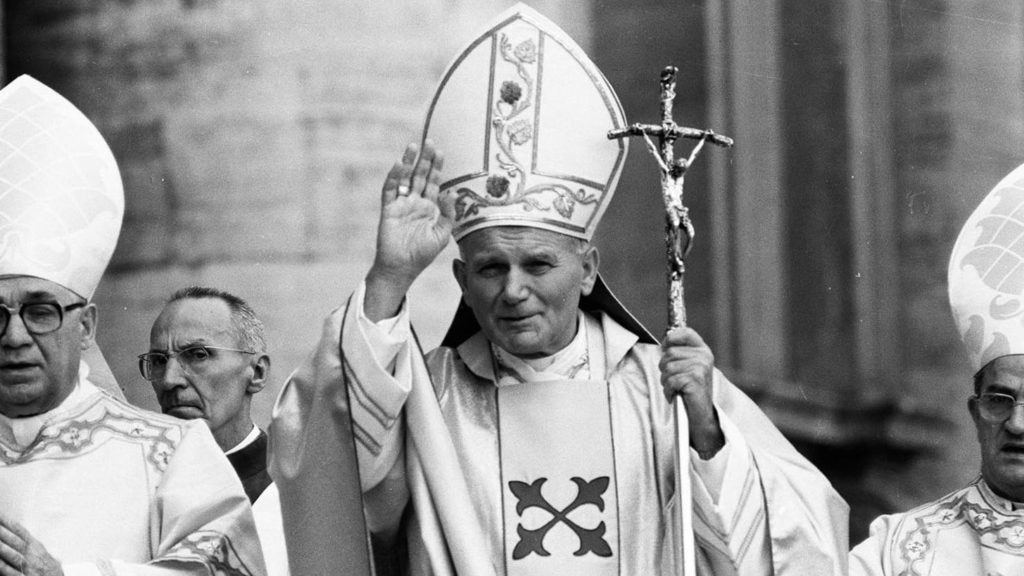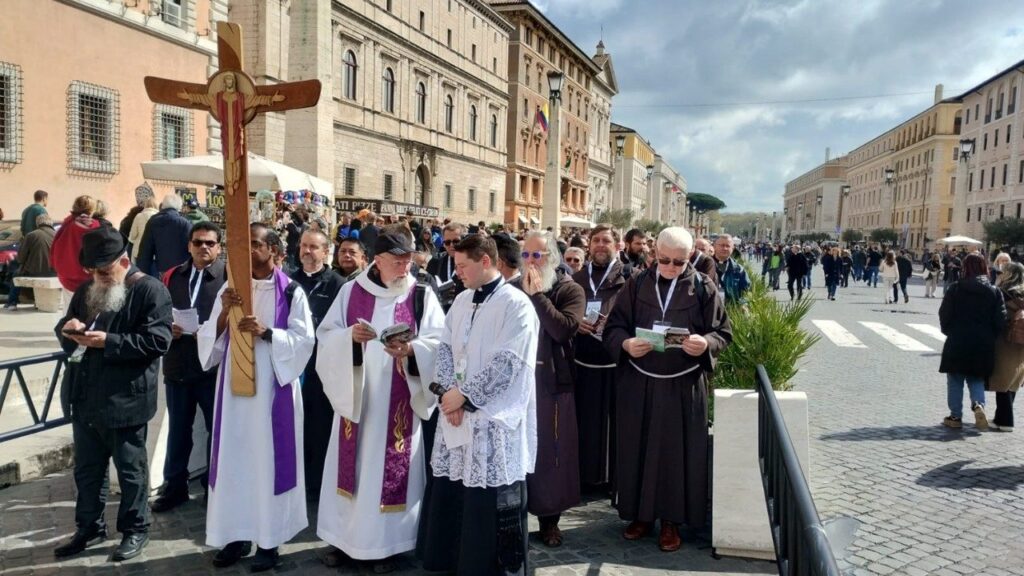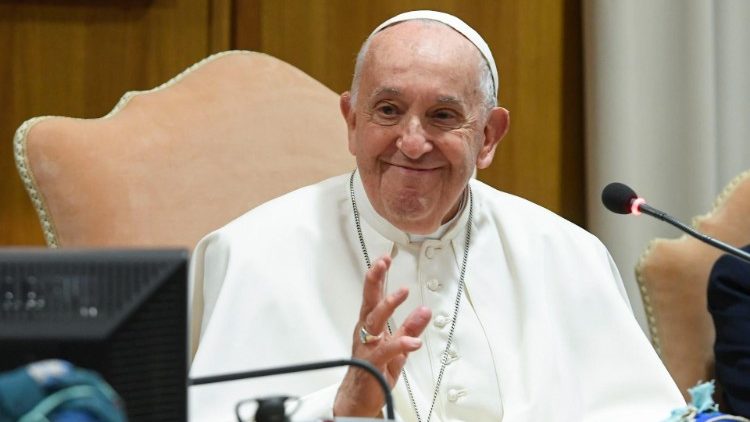Pope Recalls Saint John Paul II’s Election
And Liturgical Feasts of Saint John XXIII, Saint Teresa of Avila, and Saint Hedwig of Silesia

In the General Audience today, Wednesday, October 13, 2021, during his usual greetings to Polish-speaking faithful, Pope Francis recalled that this week the anniversary of Saint John Paul II’s election to the papacy is observed and the Liturgical Feasts of Saint John XXIII, Saint Teresa of Avila and Saint Hedwig of Silesia.
The Holy Father said that the lives of these Saints “are clear examples of Christian freedom,” central theme on which he founded his catechesis today, during the General Audience, based on Saint Paul’s Letter to the Galatians. “These Saints’ experience reminds us that there is no freedom without responsibility and without love of the truth. And the greatest realization of freedom is charity, which is made concrete in service,” concluded the Pope.
Open the Doors to Christ
“Vatican News” recalls in an article phrases that Saint John Paul II addressed to the faithful on October 22, 1978, his first day as Supreme Pontiff. “Do Not Be Afraid! Open, Open Wide the Doors to Christ!” The very Eminent Cardinals said the Pope of young people from the Vatican balcony, “have called a new Bishop of Rome; they have called him from a distant country, distant but always very close by the communion in faith and the Christian Tradition.”
“Oh, Christ! Make me be a servant, and that I be so of your sole power! Servant of your gentle power! Servant of your power, which knows no sunset! Make me be a servant! Nay, servant of servants,” cried out the Holy Father to Heaven. And he also said: “Brothers and sisters, do not be afraid to receive Christ and to accept His power! Help the Pope and all those that want to serve Christ and, with Christ’s power, to serve man and the whole of humanity!”
Let Christ Speak to Man
In the homily at the beginning of his Pontificate, the new Bishop of Rome referred to the vulnerable condition of the human being, who often “doesn’t know what he has inside, in the depth of his spirit, of his heart. He often feels insecure about the meaning of his life in this world. He feels invaded by doubt which becomes despair.” Hence, he implored: “Let Christ to speak to man! He alone has words of life, yes, of eternal life!”
On that October 22, 1978, recalls “Vatican News,” Saint John Paul II remembered in his homily that the entire Church was celebrating “World Missionary Day, in other words, he invited to pray, meditate, work so that Christ’s words of life reach all men and are heard as a message of hope, of salvation, of total liberation.”
Saint John Paul II
Karol Józef Wojtyla, elected Pope on October 16, 1978, was born in Wadowice, Poland, on May 18, 1920. He was the youngest of three children of Karol Wojtyla and Emilia Kaczorowska, who died in 1929. His older brother Edmund, a doctor, died in 1932, and his father, a non-commissioned army officer, in 1941.
He received his First Communion at 9 and the Sacrament of Confirmation at 18. Having finished his studies in Wadowice’s high school, in 1938 he registered at the Jagiellonian University of Krakow. When the Nazi Occupation Forces closed the University in 1939, young Karol worked in a quarry (1940-1944) and later in the Solvay chemical factory to subsist and to avoid deportation to Germany.
Beginning in 1942, feeling called to the priesthood, he attended formation courses in the underground Major Seminary of Krakow, directed by Archbishop Adam Stefan Sapieha. At the same time, he was one of the promoters of the “Rhapsodic Theater,” also underground. After the war, he continued his studies in Krakow’s Major Seminary, which opened again, and in the Faculty of Theology of the Jagiellonian University, until his priestly Ordination in Krakow on November 1, 1946.
On July 4, 1958, Pope Pius XII appointed him Auxiliary Bishop of Krakow and Titular of Ombi. He received Episcopal Ordination on September 28, 1958, in Wawel Cathedral in Krakow, from the hands of Archbishop Eugeniusz Baziak. On January 13, 1964, Pope Paul VI appointed him Archbishop of Krakow and on June 26, 1967, he created him Cardinal.
He took part in Vatican Council II (1962-1965), contributing especially in the elaboration of the Constitution Gaudium et Spes. Cardinal Wojtyla participated in five Assemblies of the Synod of Bishops, prior to his Pontificate. He was elected Pope on October 16, 1978, and on October 22 he began his ministry as universal Pastor of the Church.
Saint John Paul II made 146 pastoral visits in Italy and, as Bishop of Rome, he visited 317 of the 332 parishes that Rome has at present. He undertook 104 Apostolic Journeys around the world, expression of the constant solicitude of the Successor of Peter for all the Churches. Among his principal documents are 14 Encyclicals, 15 Apostolic Exhortations, 11 Apostolic Constitutions, and 45 Apostolic Letters. Pope John Paul II also authored five books.
From 1978 on he convoked 15 Assemblies of the Synod of Bishops: six Ordinary General Assemblies (1980, 1983, 1987, 1990, 1994 and 2001), one Extraordinary General Assembly (1985), and eight Special Assemblies (1980, 1991, 1994, 1995, 1997, 1998 [2] and 1999). On May 13, 1981, he suffered a serious attack in Saint Peter’s Square. Saved by the maternal hand of the Mother of God, after a long convalescence, he forgave his aggressor and, aware that he had received a new life, he intensified his pastoral commitments with heroic generosity.
He died in Rome in the Vatican’s Apostolic Palace on Saturday, April 2, 2005, at 9:37 pm, eve of the Sunday in Albis or of the Divine Mercy, a feast he instituted. His solemn funeral in Saint Peter’s Square and his burial in the Vatican Grottos were held on April 8. Pope Francis celebrated John Paul II’s Rite of Canonization on April 27, 2014.
Translation by Virginia M. Forrester
Related

Technology with a Human Face: Pope Francis’ Call for Ethical and Caring Use
Exaudi Staff
01 April, 2025
1 min

Pope Francis Continues Optimistic Recovery and Maintains Work Pace
Exaudi Staff
01 April, 2025
2 min

The Pope to the Missionaries of Mercy: God became man to reveal to the world that he never abandons us!
Exaudi Staff
30 March, 2025
2 min

God’s Mercy and the Call to Peace in Pope Francis’ Angelus
Exaudi Staff
30 March, 2025
3 min
 (EN)
(EN)
 (ES)
(ES)
 (IT)
(IT)

